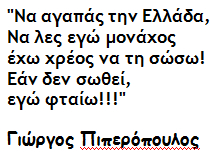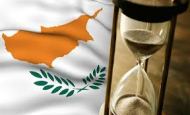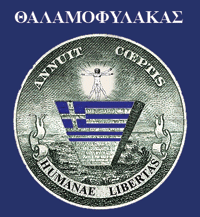Μεταβολή στην ισορροπία δυνάμεων γύρω από το διαπραγματευτικό τραπέζι για το Ελληνικό χρέος διαπιστώνει η οικονομική συντάκτης του BBC, Στέφανι Φλάντερς σε ανάλυσή της για την ιστοσελίδα του Βρετανικού δικτύου.Στην ανάλυσή της συντάκτριας του BBC τονίζεται ότι η χώρα πλήρωσε το 2011 περισσότερο τόκο κατά 23% περισσότερο σε σχέση με το 2010, παρά τα «φθηνά» δάνεια από τους Ευρωπαίους και το ΔΝΤ (σ.σ. ειρωνικά τα εισαγωγικά της συντάκτριας).
Η Στέφανι Φλάντερς σημειώνει ότι αν μελετήσει κανείς προσεκτικά τα οικονομικά αποτελέσματα του δεύτερου εξαμήνου του 2011 θα διαπιστώσει ότι η Ελλάδα κατέγραψε πρωτογενές πλεόνασμα 1,8 δις ευρώ, που σημαίνει ότι είναι σε θέση να καλύψει τις εσωτερικές ανάγκες της οικονομίας της και ότι με τα δάνεια που λαμβάνει αποπληρώνει πια αποκλειστικά το… χρέος της!!!
Υπενθυμίζεται ότι το κεφάλαιο το έχουμε ξεπληρώσει με το παραπάνω 5-6 φορές και τώρα μας “φεσώνουν” με τους τόκους. Σημειώνεται επίσης, ότι το καθεστώς θέλει να εξομοιώσει την Ιταλία με την Ελλάδα επιβάλλοντας τη λογική ότι και οι άλλες Χώρες της Ευρώπης τα ίδια υφίστανται, επειδή δανείσθηκε πρόσφατα με επιτόκιο 1,9%…
Το σχετικό άρθρο… http://www.bbc.co.uk/news/business-18099336
Stephanie Flanders Economics editor
Greek banks, the Euro and the ECB
Talk of a run on Greek deposits, and some banks being cut off from European Central Bank (ECB) support, have added a fresh twist to scary talk about Greece and the Euro.
The details are complicated, and not quite as frightening as they first appear. But the big picture is scary indeed, not least for the ECB. The numbers on how much has recently been taken out of Greek banks by depositors have been much disputed – not surprisingly, when the official figures will not be published for weeks. Depending on who you talk to, anything from 700m ($892m; £560m) to 1.2bn was taken out of banks in the days after the election, out of total deposits of around 160bn. That total, in turn, is about a third lower than it was at the end of 2009.
At the same time, the ECB has apparently now said that it won’t directly lend to some Greek banks that it judges to be technically “insolvent”. These are banks that have holes in their balance sheets, because, thanks to the restructuring of Greek sovereign debt, they can’t now expect to get back all of the money that they lent to the government. That sounds bad, but the banks that have lost access to direct ECB funding can almost certainly still get money from the Greek central bank, which, of course, is ultimately, getting its cash from the ECB (though unlike the more direct form of ECB liquidity support, all the risk implicit in this so-called ELA lending is, formally at least, borne by the Greeks alone).
As I say, both stories are complicated, and somewhat disputed, but, taken together, they do help to underscore two important realities. The first is that the sheer uncertainty hanging over Greece and the lack of a proper government is greatly increasing the room for costly financial accidents.The banks that the ECB has cut off, at least from direct ECB assistance, are due to be recapitalised any day now as part of the latest bailout. There is 48bn in the EU-IMF programme, earmarked for precisely this purpose, half of which has already been transferred to a special Greek fund. But in the current fraught situation, the Greeks can’t even sort out how to get the capital into the banks, let alone when.
The second and most important reality is that the ECB is once again exactly where it doesn’t want to be: right at the centre of events. In the eyes of the markets (and most politicians), the central bank has the power to make or break the Euro. What the institution does not have is any desire to do this, or formal legal responsibility (I have explored some of the difficult issues for the ECB here).
The fall in Greek deposits, which are down by nearly a third since the end of 2009, is one reason why the Greek banks are now so dependent on money from the ECB. The other reason, of course, is that private lenders are not willing to lend to them any more. One in five euros that Greek banks now lend to households or companies is propped up by the ECB. If Greece left the Euro, all of that would stop and the Greek banking system would simply be unable to function. Some see the leak about the ECB withdrawing funding from those banks as a giant blunder on a day when the president of the ECB, Mario Draghi, said in support of Greece only that the ECB had a “strong preference” for It staying in the Euro.
Others think it’s all highly strategic: the ECB wanted to remind Greek voters and politicians that if they stumble out of the Euro the Greek financial system, to all intents and purposes, will be finished. Not getting the next disbursement from the IMF and the EU is the least of it.
I suspect the truth is less calculated. As we have seen, this is an environment ripe for accidents and unforeseen consequences. But it would be no surprise if the ECB were trying every trick in the book to get Greece to toe the line.
Why? Because if things continue on their current trajectory, and Greece leaves, the ECB is the only institution with even a fighting chance of seeing off a panic in countries like Portugal, and “saving” the euro. Mario Draghi doesn’t want to be the Euro’s “saviour” because that ought to be a job for governments. But nor does he want to be the one to pull the plug.





































Από που προκύπτουν αυτά που λέτε στα Ελληνικά από το άρθρο στα Αγγλικά;;;
Μοῦ ἀρέσειΜοῦ ἀρέσει
pesta re file gt tha mas trelanoun….kata ta alla oi mnimoniakoi parapliroforoun to kosmo,.
Μοῦ ἀρέσειΜοῦ ἀρέσει
Καλά εσύ τώρα βρήκες πάτημα για να κάνεις την προπαγάνδα σου και να δικαιολογήσεις την κομματοσκυλίαση σου….
Τα άρθρα που ανεβαίνουν από άλλα blogs ανεβαίνουν όχι για να τα κάνει γαργάρα ο αναγνώστης αλλά για να τα κρίνει. Να κρίνει μέχρι και την σκοπιμότητα του κάθε αρθρογράφου. Αν κάποιος βρει “ελάττωμα ” στο άρθρο – όπως επισήμαναν οι παρόντες σχολιαστές δεν σημαίνει ότι η άλλη πλευρά είναι και σωστή.
Αν εσύ θεωρείς ότι με αυτό το άρθρο αποδεικνύεται ότι οι μνημονιακοί δεν παραπληροφορούν θα βρεθείς προ τραγικής εκπλήξεως…..
Μοῦ ἀρέσειΜοῦ ἀρέσει
poli kala ta les…eimai pasokos kai me taizei i ND …kanw kai kanena merokammato gia to Dimiourgia ksana …. re koroideuete to kosmo kai tou plaseretai foumara…esena egw se peiraksa vlepw…oxi oti sou plasaroun koutoxorto …oxi oti se thewroun vlaka kai sou dinoun kai link kai kala gia ola osa lene…ta pragmata einai apla…perneis to kratiko proipologismo kaneis tis prakseis (an ksereis kai katalavaineis ti leei) kai vlepeis pws kai ta daneia na min plirwseis APLA DEN BGAINEI…twra an thes akous an thes oxi…pantws emeis apodiknioume oti koroideuetai to kosmo…auta kai kali draxmi..(makari tha se agorasw tsaba me tin ipotimisi)
filika….!!! enas mnimoniakos pou diavazeis kai kserei na katalavainei…(btw den perimenei metafrasi san kati allous)
Μοῦ ἀρέσειΜοῦ ἀρέσει
1. Το άρθρο δεν είναι δικό μου και δεν έγραψα ΠΟΤΕ ότι το συμμερίζομαι.
2. Το θέμα δεν είναι να κάνεις προσθαφαιρέσεις στον κρατικό προυπολογισμό και να διαπιστώνεις ότι δεν βγαίνει. Αυτό το κάνουν όλοι. Το θέμα είναι να μπορείς να αλλάξεις τα κονδύλια του προυπολογισμού ΩΣΤΕ ΝΑ ΒΓΑΙΝΕΙ ΜΕ ΤΟΝ ΔΥΝΑΤΟΤΕΡΑ ΧΑΜΗΛΟ ΔΑΝΕΙΣΜΟ.
Αν εσύ θεωρείς ότι με τα δάνεια του μνημονίου – όταν η φοροδοτική ικανότητα μειώνεται -πως θα συνεχίσει ο προυπολογισμός προς τον περίφημο ισοσκελισμό τότε εμείς να σκίσουμε τα πτυχία μας και να ακούμε τι προτείνεις εσύ που προφανώς είσαι ΤΣΟΜΠΑΝΗΣ ΠΟΥ ΕΜΑΘΕΣ ΝΑ ΔΙΑΒΑΖΕΙΣ!!!
Συνέχισε να υποστηρίζεις τον Μπένυ που έλεγε πέρυσι ως υπουργός Οικονομικών ΟΤΙ ΔΕΝ ΓΝΩΡΙΖΕΙ ΤΟ ΧΡΕΟΣ ΤΗΣ ΧΩΡΑΣ ΑΛΛΑ ΔΑΝΕΙΖΟΤΑΝ.
Περαστικά εκ των προτέρων για τις 17 Ιουνίου…..
Μοῦ ἀρέσειΜοῦ ἀρέσει
Έκανα το κόπο να διαβάσω το αρθρο του BBC στα Αγγλικά και πουθενά δεν λέει τίποτα για πλεονάσματα.
Η προπαγάνδα έχει αρχίσει να γίνεται γλοιώδης.
Μοῦ ἀρέσειΜοῦ ἀρέσει
ναι, μία από τα ίδια με τους προηγούμενους
Μοῦ ἀρέσειΜοῦ ἀρέσει
Το άρθρο υπάρχει και το σωστό link είναι αυτό: http://www.bbc.co.uk/news/business-16746455
Μοῦ ἀρέσειΜοῦ ἀρέσει